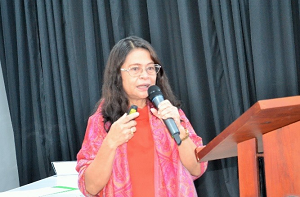 The program, “Smarter Approaches to Reinvigorate Agriculture as an Industry (SARAI) in the Philippines-Phase 2,” led by the University of the Philippines Los Baños (UPLB) continues to provide solutions to farmers for a smarter agriculture.
The program, “Smarter Approaches to Reinvigorate Agriculture as an Industry (SARAI) in the Philippines-Phase 2,” led by the University of the Philippines Los Baños (UPLB) continues to provide solutions to farmers for a smarter agriculture.
SARAI is funded by the Philippine Council for Agriculture, Aquatic and Natural Resources Research and Development of the Department of Science and Technology (DOST-PCAARRD).
This was the highlight of the accomplishments of SARAI-Phase 2 presented by the program leader, Dr. Maria Victoria O. Espaldon of UPLB, together with the project leaders from different co-implementing state universities and colleges (SUCs) during the recently conducted Midterm Review at PCAARRD, Los Baños, Laguna.
“SARAI-Phase 2 provides more accurate assessment of crop damage due to calamities and delivers site-specific crop advisories to farmers,” Dr. Espaldon said. The program help prevent potentially large losses by guiding farmers on what and when to plant based on climate forecast and anticipated water deficits or surpluses.
It uses satellite data, weather data, agronomic data, market/economic data, and farmer profile data to develop decision-support tools for crop risk and agricultural insurance, crop monitoring and forecasting, crop weather advisories and technical support, and inputs to policy and decision making. The climate information services of SARAI-Phase 2 is expected to result in positive behavioral changes among farmers that will result in improved crop yields and climate-resilient livelihoods.
SARAI-Phase 2 has 15 project components classified under three subprograms: 1) Crop characterization, integrated crop management, and model development; 2) crop-environment monitoring and forecasting; and 3) SARAI mainstreaming and knowledge management.
Included in the highlights of Dr. Espaldon’s presentation are the developed technologies such as: 1) SEAMS Image Capturing Application (SICApp), 2) Rainfall Outlook Mobile App, 3) Coffee Application Harvest Estimator (CAPHE), 4) SARAI Alerts and Advisories, 5) Soils Physical and Chemical Characteristics Database, 6) SARAI Web Open Drone Map, and the 7) Smarter Pest Identification Technology (SPIDTECH).
The program is being monitored by PCAARRD’s Agricultural Resources Management Research Division (ARMRD). It has 11 co-implementing state universities and colleges namely, Bicol University (BU), Central Luzon State University (CLSU), Central Mindanao University (CMU), Cebu Technological University (CTU), Isabela State University (ISU), Mindoro State College of Agriculture and Technology (MinSCAT), Mariano Marcos State University (MMSU), University of Southern Mindanao (USM), University of Science and Technology of Southern Philippines (USTP), Western Philippines University (WPU), and West Visayas State University (WVSU).
